|
|
|
Sort Order |
|
|
|
Items / Page
|
|
|
|
|
|
|
| Srl | Item |
| 1 |
ID:
163077
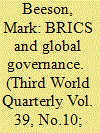

|
|
|
|
|
| Summary/Abstract |
The impact of rising powers generally and the BRICS - Brazil, Russia, India, China and South Africa - in particular on the existing global order has become controversial and contested. Donald Trump’s nationalist foreign policy agenda has raised questions about the BRICS willingness and capacity to provide leadership in place on an American administration that is increasingly inward looking. As a result, the rise of BRICS poses potential normative and structural challenges to the existing liberal international order. Given its geoeconomic significance, China also poses a potential problem for the other BRICS, as well as the governance of the existing order more generally. Consequently, we argue that it will be difficult for the BRICS to maintain a unified position amongst themselves, let alone play a constructive role in preserving the foundations of ‘global governance’.
|
|
|
|
|
|
|
|
|
|
|
|
|
|
|
|
| 2 |
ID:
163078
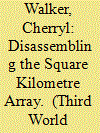

|
|
|
|
|
| Summary/Abstract |
The article poses questions about astronomy and its local, national and global developmental impacts, drawing on ongoing research around the internationally networked Square Kilometre Array (SKA) radio telescope in South Africa. The relationship between progress in global science and technology and societal change has traditionally been framed through western-centric notions of progress imbued with universalism; the field of astronomy exemplifies this approach, with its assumptions of an inherently positive correlation between its science and loosely defined notions of ‘development’. We problematise this assumption through an analysis of the multiple notions of development at different scales of analysis in the SKA. We argue that large astronomy projects such as the SKA are best understood as dense assemblages of science, infrastructure, human agency and politics, in which historically rooted local concerns are marginalised in the name of the national or global public interest.
|
|
|
|
|
|
|
|
|
|
|
|
|
|
|
|
| 3 |
ID:
163074


|
|
|
|
|
| Summary/Abstract |
International service learning, a form of service learning where students travel to developing countries to provide community services of varying types, has come to be common practice at universities throughout the Global North. This paper reports and discusses a case study focused on the ethical questions arising from current practice at one Canadian university. The study follows the path students take from their home university to their final placement. In the context of the political economy of North–South relations in a period of neoliberalism, the analysis considers the ethics of power differentials, reciprocity, accountability, student preparedness and qualifications in relation to host communities. The article concludes with a critique of post-secondary institutional involvement with and promotion of international service learning.
|
|
|
|
|
|
|
|
|
|
|
|
|
|
|
|
| 4 |
ID:
163076
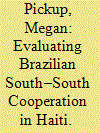

|
|
|
|
|
| Summary/Abstract |
I focus on evaluating Brazilian development and humanitarian cooperation in Haiti to answer how emerging providers such as Brazil are contributing to global development through cooperation. The paper establishes criteria for evaluation, arguing that global standards for aid effectiveness need to be expanded. I argue that when assessed on ownership, efficiency and sustainability, cooperation holds several advantages and limits, such as misplaced assumptions that Brazil’s approach is appropriate elsewhere. The discussion is rooted in the context of Haiti in order to underline how outcomes are not pre-determined, but rather depend on the model’s interaction with the partner context.
|
|
|
|
|
|
|
|
|
|
|
|
|
|
|
|
| 5 |
ID:
163080
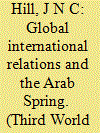

|
|
|
|
|
| Summary/Abstract |
This article contributes to the Global International Relations project by critically evaluating the roles ascribed to Europe and the EU by Levitsky and Way in their model for explaining regime transitions. Focusing primarily on their international dimensions of linkage and leverage, it assesses both the normative geopolitical underpinnings and explanatory power of their thesis, drawing on the North African cases of Tunisia and Mauritania at the start of the Arab Spring to illustrate and substantiate its observations and arguments. It concludes that the EU’s failure to discipline either country’s competitive authoritarian regime raises important questions about the validity of the privileged role in which they cast Europe.
|
|
|
|
|
|
|
|
|
|
|
|
|
|
|
|
| 6 |
ID:
163075
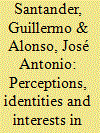

|
|
|
|
|
| Summary/Abstract |
The relevance acquired in recent years by South–South cooperation seems to be connected with deeper structural transformations occurring in the international system. However, the variety of cooperation models promoted by new providers in the South requires the identification of complementary factors to help explain current patterns. A set of socio-cognitive elements, related to each country’s perceptions, identities and interests, can yield greater understanding of the variety of South–South cooperation models. Such an approach is here applied to the cases of Chile, Venezuela and Brazil – three important providers from the South – in order to explore their different cooperation models.
|
|
|
|
|
|
|
|
|
|
|
|
|
|
|
|
| 7 |
ID:
163072
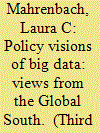

|
|
|
|
|
| Summary/Abstract |
Government intentions stand at the heart of debates about how big data can and should be used in the Global South. This paper provides new insights by examining the political and economic visions promoted by emerging power governments in Brazil, India and China (the BICs). Doing so is crucial as these countries not only comprise some of the world’s largest populations, but have also demonstrated their initiative in national and international promotion of big data politics. Drawing on a content analysis of strategic and legal documents discussing the use of big data, we identify potential areas for big data cooperation among the BICs by determining the compatibility of national policy visions. Three visions are apparent: data as a force for political liberation or repression, for improving public services and for facilitating development. Successful BIC cooperation is likely related to the latter two, but less probable for the liberation/repression vision. We conclude by identifying the implications of BIC engagement with big data for the Global South more broadly.
|
|
|
|
|
|
|
|
|
|
|
|
|
|
|
|
| 8 |
ID:
163073
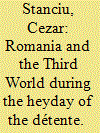

|
|
|
|
|
| Summary/Abstract |
All Warsaw Pact countries developed intense relations with Third World countries during the 1970s, following in Moscow’s footsteps, allegedly supporting the struggle against Western imperialism while making profitable arms deals. One Warsaw Pact country, though, saw things differently: it was both American and Soviet imperialism that had to be fought off. This paper reassesses the origins and nature of Romania’s Third World policy in the context of the Soviet–American détente of 1972. Détente was perceived in Bucharest as a risk to the country’s independent foreign policy and a consolidation of the existing bipolarity which is why Romania tried to mobilise small and medium states of the Third World in a fight against hegemony and underdevelopment. Although they adhered to the developmental debates and tried to join the Group of 77, the Romanians viewed underdevelopment not necessarily in structural terms but rather as a product of political obstructions exerted by the superpowers. Refusing the take the Soviet side in the Third World, Romania tried to convince Third World leaders that unity and cooperation among the ‘unprivileged’ were a shield against foreign interference and a guarantee of development.
|
|
|
|
|
|
|
|
|
|
|
|
|
|
|
|
| 9 |
ID:
163079
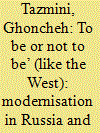

|
|
|
|
|
| Summary/Abstract |
Having passed through a labyrinth of social contradictions, both Russia and Iran have reached a point on their historical timelines where they have transcended the logic of development of the eighteenth, nineteenth and twentieth centuries. Today, Russian and Iranian modernisation reflects the interaction of universal norms and practices and specific cultural traditions. As an epistemological category, modernity can no longer be enchained in the grip of a totalising narrative. Modernity has given rise to civilisational patterns that share some core characteristics, but which unfold differently. The Russian and Iranian historical experiences reveal the need to take a much broader view of the modernisation process by placing it in the context of cultural adaptation of civilisational particularities to the challenge of modernity. The era of fixed, Euro-centric and non-reflexive modernity has reached its end, and we have, in practical terms, the emergence of ‘multiple modernities’.
|
|
|
|
|
|
|
|
|
|
|
|
|
|
|
|
|
|
|
|
|